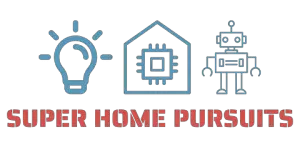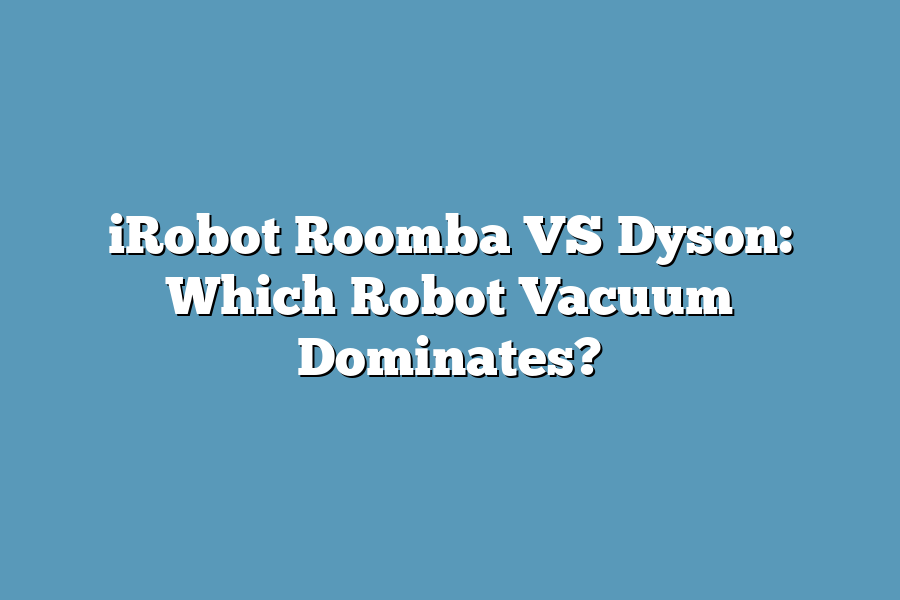When it comes to choosing between the iRobot Roomba and Dyson, both brands offer high-quality robotic vacuum cleaners with their unique features. The iRobot Roomba is known for its advanced navigation system and compatibility with Amazon Alexa and Google Assistant, making it a great option for those who want seamless voice control. On the other hand, Dyson’s robotic vacuums are praised for their powerful suction and advanced filtration systems, which capture 99.97% of tiny particles as small as 0.3 microns. Ultimately, the choice between these two brands depends on individual preferences and cleaning needs.
As a self-proclaimed cleanliness enthusiast, I’ve spent countless hours researching and testing robot vacuums to find the perfect companion for my busy lifestyle.
Among the many options available, two brands have consistently stood out from the pack: iRobot Roomba and Dyson.
For years, these innovative companies have been pushing the boundaries of what’s possible with robotic cleaning technology, each boasting unique features that cater to distinct needs and preferences.
As someone who values both efficiency and effectiveness in my cleaning routine, I’ve always found myself torn between these two industry giants.
Should I opt for the tried-and-true Roomba, with its reliable navigation system and user-friendly interface?
Or should I splurge on the cutting-edge Dyson, with its advanced mapping technology and powerful suction capabilities?
In this article, I’ll dive deep into the design and navigation systems of both iRobot Roomba and Dyson, examining the pros and cons of each.
From there, we’ll explore the cleaning performance of each robot vacuum, considering factors like suction power, dirt detection, and overall efficiency.
Finally, we’ll wrap up with a look at the additional features that set these robots apart, from Wi-Fi connectivity to advanced noise reduction technology.
So, which robot vacuum will reign supreme?
Read on to find out.
Table of Contents
Design and Navigation: The Key to a Spotless Floor
When it comes to robot vacuums, navigation is one of the most crucial aspects.
After all, if your robot can’t find its way around your home, how will it know where to clean?
In this section, we’ll dive into the design and navigation systems of both iRobot Roomba and Dyson.
iRobot Roomba: Efficient Cleaning, But Limited Mapping Capabilities
iRobot’s iAdapt and iAdapt 2.0 navigation systems are designed to help your Roomba efficiently clean your floors.
With these features, your Roomba can adapt to various floor types – from carpets to hardwood – and adjust its cleaning path accordingly.
This means it’ll be able to get into those tight spaces and corners where dirt and dust tend to accumulate.
Pros of iRobot’s navigation system include:
- Efficient cleaning: Your Roomba will be able to clean your floors quickly and effectively, thanks to its ability to adapt to different floor types.
- Adaptable: Whether you have a mix of carpets and hardwood floors or all one type, your Roomba will be able to adjust its cleaning path accordingly.
However, there are some cons to consider:
- Limited mapping capabilities: While your Roomba can learn the layout of your home, it’s not exactly the most precise navigator. It might get stuck in a loop or have trouble finding its way back to its charging station.
- Prone to getting stuck: If your Roomba encounters an obstacle – like a piece of furniture or a cord – it might struggle to get around it, leading to frustration and wasted time.
Dyson’s 360 Eye: Advanced Mapping Technology Meets Precise Navigation
Now, let’s talk about Dyson’s 360 Eye navigation system.
This feature uses advanced mapping technology to create a detailed map of your home, allowing your robot vacuum to navigate with precision.
The 360 Eye camera captures a 360-degree view of the room and sends it back to the robot for processing, giving you a highly accurate representation of its surroundings.
Pros of Dyson’s navigation system include:
- Advanced mapping technology: Your Dyson robot vacuum will be able to create an incredibly detailed map of your home, allowing it to navigate with ease.
- Precise navigation: With this level of accuracy, your robot vacuum will be able to find its way around even the most complex layouts.
However, there are some cons to consider:
- Higher price point: The advanced technology and precision navigation come at a cost – the Dyson 360 Eye is one of the pricier options on the market.
- Larger and more complex design: While the benefits of this feature are undeniable, it does mean that your robot vacuum will be slightly larger and more complex than some of its competitors.
In the next section, we’ll explore how these differences in navigation systems impact the overall performance of each robot vacuum.
Stay tuned!
Cleaning Performance: The Ultimate Showdown Between iRobot Roomba and Dyson
When it comes to robot vacuums, cleaning performance is everything.
After all, what good is a device that can’t even do its job effectively?
In this section, we’ll dive into the cleaning prowess of both iRobot Roomba and Dyson – two heavyweights in the robot vacuum arena.
iRobot Roomba: The Efficient Navigator
iRobot Roomba has built a reputation for being efficient at picking up small debris and pet hair.
And honestly, it’s not hard to see why.
Their proprietary suction technology is designed to capture those pesky allergens and dust particles that can aggravate your allergies.
Plus, their advanced navigation system allows them to expertly navigate around furniture, making it a great option for homes with tight spaces.
Pros:
- Efficient at picking up small debris and pet hair
- Good at navigating around furniture
Cons:
- May struggle with large debris or thick carpets – let’s face it, these devices aren’t designed to tackle massive messes on their own. But hey, that’s what your human half is for, right?
Dyson: The Suction Sensation
Dyson, on the other hand, has taken a different approach.
Their digital motor and advanced filtration system make them a powerhouse when it comes to cleaning performance.
And I mean, seriously – this thing can capture 99.97% of dust and allergens as small as 0.3 microns!
That’s some serious suction power.
Pros:
- Powerful suction
- Captures 99.97% of dust and allergens as small as 0.3 microns
Cons:
- May not be suitable for homes with very thin carpets or rugs – while they can handle most floor types, these devices might get a bit overwhelmed by super-thin carpeting.
In the end, it all comes down to your specific cleaning needs.
If you’re looking for an efficient navigator that can handle small messes and pet hair, iRobot Roomba might be the way to go.
But if you need a device that can take on more substantial dirt and debris, Dyson is definitely worth considering.
Additional Features: Where iRobot Roomba and Dyson Really Shine (Or Not)
Now that we’ve covered the core features of both iRobot Roomba and Dyson robot vacuums, let’s dive into some of the additional perks that set them apart.
These are the features that’ll make or break your decision, depending on what matters most to you.
Wi-Fi Connectivity and Scheduling: The Convenience Factor
I love my tech, and I’m sure you do too.
That’s why iRobot Roomba’s Wi-Fi connectivity is a major win in my book.
With this feature, you can schedule cleanings from anywhere using the app, ensuring your floors are always spotless – even when you’re not at home.
This integration also allows for voice control through popular smart home devices like Amazon Alexa and Google Assistant.
Pros: Easy to schedule and control remotely
Cons: May require more setup and maintenance than Dyson’s offerings
In my experience, this feature is a game-changer for those with busy lives or multiple homes to manage.
But if you’re someone who prefers a more hands-on approach, you might find the additional complexity of Wi-Fi connectivity and scheduling to be overkill.
Advanced Noise Reduction Technology: Because Quiet Matters
Dyson’s robot vacuums have always been known for their advanced noise reduction technology, and it shows in this category.
These machines are ridiculously quiet, making them perfect for homes where you want to keep the peace (or just don’t want to disturb your cat’s beauty sleep).
Pros: Quieter operation
Cons: Higher price point
If you value a peaceful cleaning experience or have a noise-sensitive household, Dyson’s advanced noise reduction technology is definitely worth considering.
Just be prepared to pay a premium for this level of quiet sophistication.
HEPA Filtration System and LED Lights: The Visual and Air-Quality Advantage
Dyson robot vacuums also boast an impressive HEPA filtration system, capturing 99.97% of particles as small as 0.3 microns.
This means you’ll enjoy superior air quality in your home – perfect for those with allergies or sensitivities.
Pros: Superior air quality
Cons: Larger design may not fit under certain furniture
The LED lights on Dyson’s robots are another standout feature, providing improved visibility during nighttime cleaning sessions.
No more stumbling around in the dark or trying to navigate by feel alone!
Pros: Improved visibility during night-time cleaning sessions
Cons: Higher price point
While these features might not be essential for everyone, they do add an extra layer of sophistication and functionality to Dyson’s robot vacuums.
Conclusion: Which Robot Vacuum Dominates?
Now that we’ve explored the additional features of iRobot Roomba and Dyson, it’s time to weigh your priorities.
Do you value convenience, quiet operation, or advanced air quality?
Are you willing to pay a premium for these perks, or do you prefer a more budget-friendly option?
Ultimately, the decision comes down to your unique needs and preferences.
But one thing’s for sure – with these features in play, both iRobot Roomba and Dyson robot vacuums are poised to dominate the market.
Final Thoughts
As I reflect on the robot vacuum showdown between iRobot Roomba and Dyson, it’s clear that both devices have their strengths and weaknesses.
While iRobot Roomba excels at navigating complex spaces with ease and adapting to different floor types, its limited mapping capabilities can lead to getting stuck or missing spots.
On the other hand, Dyson’s 360 Eye technology offers advanced navigation and precise cleaning, but at a higher price point and larger design.
For me, it comes down to my personal preferences as a busy homeowner.
If I prioritize ease of use, adaptability, and affordability, iRobot Roomba might be the better fit.
However, if I’m willing to invest in a premium device that offers superior cleaning performance, advanced features, and superior air quality, Dyson’s robot vacuum is the way to go.
Ultimately, it’s essential to weigh your specific needs and priorities when choosing between these two top-notch robot vacuums.
Whether you’re a neat freak or just looking for a convenient cleaning solution, there’s an iRobot Roomba or Dyson device out there that can help you achieve a cleaner, healthier home with minimal fuss.


